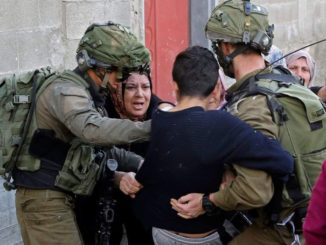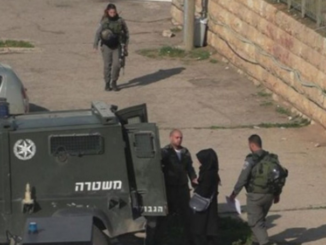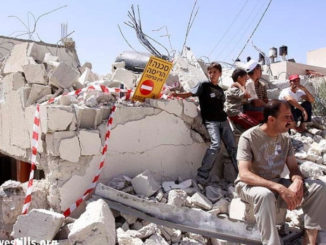
“Kenya is a natural ally of the Palestinian struggle against Israeli occupation. If Kenyans believe that Palestinians are terrorists because they resist occupation and colonialism by Israel, then they are betraying their own history and anti-colonial struggle legacy. Israel’s ‘aid’ and investment in Kenya is not free. In return, Israel demands Kenyan silence about Israeli crimes against Palestinians.”
This was the main message from Palestinian author and journalist, Ramzy Baroud, who is currently on a 10-day tour of the Kenyan capital, Nairobi, as part of Kenya’s Palestine Solidarity Week.
Baroud, who is a guest of the Kenyan Palestine Solidarity Movement (KPSM), is the first Palestinian writer to embark on such a tour of Kenya and is impressed by the depth and quality of discussions that he is having with hundreds of Kenyans from all walks of life at diverse events across Nairobi.
Palestine Solidarity Week in Nairobi, Kenya continues .. https://t.co/9E74rlVDWB #Kenya #Palestine #LastEarth #RamzyBaroudKenyaTour; #SilenceIsNotAnOption #KenyaPalestineSolidarityWeek pic.twitter.com/5h4Yer8YRd
— Ramzy Baroud (@RamzyBaroud) June 29, 2019
“I have met with civil society, various media, religious groups, writers, poets, and political activists. In some cases, the questions that Kenyans asked were far superior to those that I have been asked in North America,” admitted Baroud in an interview with the Afro-Palestine Newswire Service.
At the end of Baroud’s first event hosted by Amnesty International Kenya at Ufungamano House on June 25, the audience was chanting ‘Free Palestine’. This was an important moment for Baroud as it demonstrated to him that Kenyans were a natural ally for Palestinians because of their unique history and anti-colonial struggle.
“From that moment onwards, I realized that there is a very real understanding among Kenyans of what Palestinians are going through. This is value-based solidarity based on personal experience,” says Baroud.
Palestine: Returning to our roots in Africa and the rest of the Global South. A short promo of my discussion with Kenyan journalist Elijah Mwangi, to be aired in full and shared soon https://t.co/LQrolq2R8z pic.twitter.com/aWFNiA3PFP
— Ramzy Baroud (@RamzyBaroud) June 29, 2019
Kenya’s struggle for independence and Palestine’s current liberation struggle mirror each other. “If we were to change the dates and places and replace ‘Kenya’ with ‘Palestine’ it would be like reading my own history,” says the widely-published and highly acclaimed Palestinian writer.
Baroud, however, is not interested only in Kenya’s past struggles. Through the Ukombozi Library, he was able to meet and engage with young social justice activists from Mathare and Dandora, to gain a better understanding of the current challenges facing Kenya.
“It is shameful that the Israeli government is exploiting Kenya’s socio-economic challenges to whitewash its oppression of the Palestinians,” says Baroud, referring to Israeli offers of assistance to the Kenyan investment, trade, security, technology, and agriculture sectors.
Dr Ramzy Baroud, Palestinian author, journalist & academic chose to launch his new book 'The Last Earth: A Palestinian Story' in Kenya https://t.co/M9mWbct8YT #Kenya #Palestine #LastEarth #RamzyBaroudKenyaTour; #SilenceIsNotAnOption #KenyaPalestineSolidarityWeek pic.twitter.com/WnOrZrXyeh
— Ramzy Baroud (@RamzyBaroud) June 28, 2019
Israel’s “philanthropy” in Kenya and the rest of the continent, Baroud says, is a replica of apartheid South Africa’s attempts to buy support for its apartheid policies.
“The South African apartheid regime also developed a policy of ‘helpfulness’ towards poorer African nations, offering to share its agricultural and mining know-how. Most African nations refused Pretoria’s offers, and ultimately formed the frontline of resistance against South African apartheid. Like South Africa’s ‘neighborliness’, Israel’s ‘aid’ and investment in Kenya is not free. The repayment that Israel demands is Kenyan silence about Israeli crimes against Palestinians,” warned Baroud.
Baroud was also able to reach out to the city’s Muslim community, by speaking at Nairobi’s iconic Jamia Mosque – the largest and one of the most important mosques in the country.
Photos from last few events in Nairobi, Kenya, including Amnesty, the Kenya National Theater and a Kenya Broadcasting Corporation Interview with Khainga O'Okwemba.@kenyapalestine #kenyapalestinesolidarityweek #SilenceIsNotAnOption pic.twitter.com/PcptudCGDw
— Ramzy Baroud (@RamzyBaroud) June 28, 2019
KPSM co-chairperson, Naomi Barasa, is encouraged by the response that Baroud has received. “A Palestinian voice has long been missing in Kenya, and we hope that this is the first of many such visits by Palestinians who will be able to explain – first-hand – the true nature of Israel’s brutal occupation.”
Barasa also commended the Kenyan Human Rights Commission (KHRC) for their unwavering support for human rights in Kenya and beyond. The KHRC, along with KPSM, supported and co-hosted Kenya Palestine Solidarity Week.
My interview at SwitchTV Morning Live program, Nairobi, Kenya. Thank you to the excellent and well-informed host @nickmudimba #MorningLiveKE https://t.co/Vd8gexhV5O #Kenya #Palestine #LastEarth #RamzyBaroudKenyaTour #SilenceIsNotAnOption #KenyaPalestineSolidarityWeek pic.twitter.com/2rQjBDPxjT
— Ramzy Baroud (@RamzyBaroud) June 28, 2019
KHRC’s executive director, George Kegoro, regards the Palestine Solidarity Week initiative as a crucial part of human rights work in Kenya.
“Listening to Ramzy Baroud and attending the various events during Palestine Solidarity Week has demonstrated the importance of having Palestine solidarity as a permanent fixture on the international solidarity agenda of KHRC and all justice-seeking organizations in Kenya,” said Kegoro.
Kegoro added that KHRC, along with the assistance of others, would continue to mobilize support in Kenya for the struggle against the Israeli occupation of Palestine.
- For photographs of events, see the Kenya na Palestine Facebook page.
- To arrange an interview with Ramzy Baroud, please contact:
- Zahid: +254 722 344 900
- Naomi: +254 722 288 075 or Abdulqadir: +254 722 235 797







